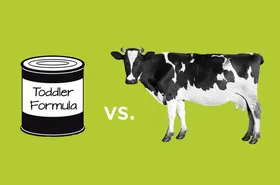Supporting Your Child's Natural Immunity with Nutrition
A strong immune system is a child's best defense against illness. Learn how to empower your child's natural defenses through nutrition, lifestyle, and expert advice
Updated September 25, 2024

Since the COVID-19 pandemic, immunity has received extra attention. But having a healthy immune system is essential all year round, not just during higher-risk times.
By understanding the factors that influence immunity and implementing practical strategies at home, parents and caregivers can equip their children with the tools they need to thrive.
» Start empowering your child's immune system with a nutrient-rich diet
Understanding Immunity
The immune system is a complex network of organs and processes that work together to protect the body from harmful pathogens. [1] It consists of two main parts:
- The Innate Immune System: This is the body's first line of defense, acting quickly to prevent germs from entering. It includes physical barriers like skin and mucus membranes.
- The Adaptive Immune System: This system fights germs directly when the innate system isn't enough. It's made of antibodies and specialized cells like B and T cells.
Immunity to illnesses develops as the body builds up antibodies to specific germs. This can happen through:
- Active Immunity: This is achieved when exposed to germs that trigger antibody production. This can happen through natural exposure or vaccination.
- Passive Immunity: When someone is given antibodies rather than producing them alone. For example, babies receive antibodies from their mothers through the placenta at birth.
Much of the immune system is established in early childhood as kids are exposed to life outside the womb. [2]
» Learn more about the building blocks of childhood nutrition
Signs of a Weakened Immune System
While it's normal for children to experience several colds per year, especially if they're in daycare or school settings, some signs might indicate a weakened immune system:
- Frequent Illnesses: Your child seems to catch every bug going around.
- Severe Infections: Common colds often progress to more serious conditions like pneumonia.
- Prolonged Recovery: Bouncing back from typical childhood illnesses takes an unusually long time.
- Delayed Healing: Cuts, scrapes, or other wounds heal slower than expected.
- Recurring Issues: Persistent ear infections, sinus problems, or other repetitive health concerns.
- Autoimmune Disorders: The immune system mistakenly attacks the body's cells, leading to various conditions.
These signs don't necessarily mean your child has a compromised immune system but warrant discussion with a healthcare professional. Early identification and intervention can help support their overall health and well-being.
Occasional illnesses are a normal part of childhood and can help strengthen the immune system. The key is to watch for unusual or concerning patterns in your child.
» Discover nutrition challenges and solutions for kids
How Nutrition Helps Immune Health
A well-balanced diet rich in essential nutrients provides the building blocks the body needs to create and maintain a robust immune system. [3] Let's explore some important nutrients and their roles in immune health.
Zinc
Zinc is a mineral that's crucial for the development and function of immune cells and has been shown to have antiviral solid activities.
Food Sources
- Legumes: lentils, beans, and chickpeas
- Seeds: pumpkin, squash, sesame, and hemp
- Nuts: pine nuts, peanuts, cashews, and almonds
- Whole grains: quinoa, brown rice, and barley
- Potatoes
Recommended Dietary Allowance
- For children aged 1–3 years old: 3 mg per day
- For children aged 4–8 years old: 5 mg per day [4]
Practical Tip: Sprinkle pumpkin seeds on salads or oatmeal, or offer hummus as a snack with vegetable sticks.
» Explore tips and tricks for childhood nutrition
2. Vitamin C
Vitamin C is a powerful antioxidant known to help support normal wound healing and protect cells from stress-related damage. It's also crucial for producing and functioning white blood cells, critical players in the immune system.
Food Sources
- Strawberries
- Bell peppers
- Broccoli
- Dark leafy greens
- Citrus fruits
- Pineapple
- Brussels sprouts
- Tomatoes
- Kiwi
Recommended Dietary Allowance
- For children aged 1–3 years old: 15 mg per day
- For children aged 4–8 years old: 25 mg per day
Practical Tip: Offer a variety of colorful fruits and vegetables throughout the day. A small orange or half a cup of strawberries can meet a young child's daily vitamin C needs.
» Find out why baby cereal is so important for health
3. Vitamin D
Often called "the sunshine vitamin," vitamin D is crucial for immune health. It helps activate T cells that are responsible for detecting and destroying foreign pathogens. [5]
Food Sources:
- Fatty fish: salmon, tuna, and mackerel
- Egg yolks
- Fortified foods: plant milk, orange juice, and baby cereals
- UV-exposed mushrooms
Recommended Dietary Allowance (RDA)
- For children aged 1–18 years old: 600 IU (15 mcg) per day [6]
Practical Tip: While food sources are essential, some kids may need vitamin D supplements, especially those living in areas with limited sunlight or darker skin tones.
» Learn about the benefits of vitamin D and calcium for kids
4. Vitamin E
Vitamin E is a fat-soluble antioxidant that helps protect cells from damage. It's particularly important for the immune system as we age.
Food Sources
- Wheat germ oil
- Sunflower seeds
- Almonds
- Peanut butter
- Avocado
- Spinach
- Broccoli
Recommended Dietary Allowance
- For children aged 1–3 years old: 6 mg per day
- For children aged 4–8 years old: 7 mg per day [7]
Practical Tip: Offer a handful of sunflower seeds as a snack, or spread some almond butter on whole-grain toast.
» Learn more about the benefits of almonds
5. Vitamin A
Vitamin A helps regulate the immune system and protect against infections by keeping skin and tissues in the mouth, intestines, respiratory system, and stomach healthy.
Food Sources:
- Carrots
- Sweet potatoes
- Mango
- Spinach
- Pumpkin
- Bell peppers
Recommended Dietary Allowance
- For kids aged 1–3 years old: 300 mcg RAE per day
- For kids aged 4–8 years old: 400 mcg RAE per day [8]
Practical Tip: Serve sweet potato wedges as a side dish, or offer carrot sticks with hummus as a snack.
» Check out the best feeding schedule for 1-year-olds
6. Omega-3 Fatty Acids
These essential fats play a crucial role in immune system regulation. They help reduce inflammation, which is vital for overall immune function.
Food Sources
- Flaxseed
- Chia seed
- Hemp seed
- Walnuts
Recommended Daily Intake
While there's no official RDA, many experts suggest children consume 250–500 mg of combined EPA and DHA daily.
Practical Tip: Add ground flaxseed to smoothies or oatmeal, or offer a small handful of walnuts as a snack.
» Learn about the essential omega-3s and 6s for healthy growth
7. Fiber
While not directly linked to immunity, fiber supports gut health and is closely tied to immune function. A healthy gut microbiome helps train and modulate our immune system.
Food Sources
- Fruits and vegetables
- Whole grains
- Nuts and seeds
- Legumes
Recommended Daily Intake
- For children aged 1–3 years old: 19 grams per day
- For children aged 4–8 years old: 25 grams per day
Practical Tip: Choose a whole-grain option and include a variety of fruits and vegetables in meals and snacks.
» Check out these healthy school meals kids will love
Should Kids Use Supplements?
Supplements can be beneficial in addressing specific nutrient deficiencies or supporting children with restricted diets. Common examples include:
- Vitamin D for children with limited sun exposure
- Omega-3 fatty acids for those who don't eat fish regularly
- Iron for children at risk of deficiency
- Multivitamins for very restrictive diets
- Probiotics for gut health support
Supplements are not a substitute for a balanced diet. They should complement, not replace, nutritious whole foods. Always prioritize meeting nutritional needs through food first, and consider supplements only when a doctor recommends them.
» Discover the importance of nutrition in the first 1000 days
The Importance of a Varied Diet
While understanding individual nutrients is important, no single one is a quick fix for immunity. The best approach is to help your child meet their nutritional needs through a varied diet rich in whole foods.
Here are some tips for ensuring a varied diet:
- Eat the Rainbow: Encourage your child to eat fruits and vegetables of different colors. Each color represents different phytonutrients that support health in various ways.
- Mix Up Protein Sources: If your child eats animal products, include a variety of lean meats, fish, and eggs. For plant-based diets, rotate between different legumes, nuts, and seeds.
- Whole Grains: Offer a variety of whole grains, such as quinoa, brown rice, oats, and whole wheat bread.
- Healthy Fats: Include sources of healthy fats like avocado, olive oil, and nuts in your child's diet.
- Limit Processed Foods: While convenient, many processed foods lack the nutrients in whole foods and may contain added sugars and unhealthy fats.
» Discover healthy ways to supplement breastfeeding with formula
Balancing Convenience and Nutrition
Sometimes, achieving a varied, nutrient-rich diet is easier said than done. Parents are busy, and kids' nutritional needs constantly change as they grow. The challenge of providing balanced nutrition while managing hectic schedules can seem impossible.
Fortunately, some solutions can help ensure convenient yet healthy nutrition for kids. Else Nutrition products are formulated to provide a balanced nutritional profile, catering to various dietary needs:
- Allergen-Friendly: Ideal for children with dairy, soy, or gluten allergies.
- Plant-Based: Suitable for families following a plant-based lifestyle.
- Whole Food Based: Made from minimally processed whole foods, offering a healthier alternative to many conventional options.
- Nutrient-Dense: Designed to provide a range of essential nutrients, helping to fill potential gaps in a child's diet.
Else Nutrition makes it easy to give your child the nourishment they need at any age, even on the busiest days.
» Give your child the best start to a healthy life with Else Nutrition
Bonus Tips for Boosting Immunity
While nutrition plays a role in immune health, other lifestyle factors are also important:
- Encourage Natural Exposures: Let your kid socialize with people of different ages, interact with pets, and play in various environments. This helps their immune system learn and adapt.
- Teach Good Hygiene Practices: Show your child proper hand-washing and the importance of covering their mouth and nose when coughing or sneezing. Good hygiene helps prevent the spread of germs.
- Ensure Enough Sleep: Establish a consistent sleep routine to support overall health and immunity. During sleep, the body produces cytokines, proteins that help fight infection and inflammation.
- Promote Physical Activity: Regular exercise can boost the immune system by promoting good circulation, which helps immune cells move through the body more efficiently.
- Manage Stress: Help your child develop stress-management techniques, as chronic stress can weaken the immune system. This could include simple breathing exercises, mindfulness practices, or calming activities like coloring or listening to music.
- Maintain Good Air Quality: Leave a window open for fresh air even in winter, and clean AC filters at least twice a year. Good air quality can help prevent respiratory issues
- Stay Up-to-Date on Vaccinations: Vaccines work by imitating an infection, which prompts the immune system to produce antibodies. This "trains" the immune system to fight off that particular disease if exposed to it in the future.
» Learn more about nutrition during pregnancy
It's a Journey, Not a Destination
While a strong immune system is ideal, it's not a guarantee against illness. Even kids with robust immune systems can get sick. The goal is to support overall health and resilience, not to eliminate all sickness.
Try to avoid obsessing over every nutrient or pushing your child to eat perfectly all the time. That can lead to unnecessary stress and anxiety, which can actually weaken the immune system.
Instead, focus on including a variety of nutrient-dense foods, encouraging healthy lifestyle habits, and being patient and compassionate with yourself and your little one. Small, sustainable changes over time can make a big difference in supporting your child's immune health.
» Support your child's immune system with the right nutrition
The content and advice provided in this article is for informational purposes only and is not a substitute for medical diagnosis, treatment, advice for specific medical conditions. Always consult a pediatrician to understand the individual needs of your child.
References
[1] Institute for Quality and Efficiency in Health Care (IQWiG), “In brief: How does the immune system work?,” InformedHealth.org - NCBI Bookshelf, Jun. 06, 2023. Available: https://www.ncbi.nlm.nih.gov/books/NBK279364/
[2] N. Jain, “The early life education of the immune system: Moms, microbes and (missed) opportunities,” Gut Microbes, vol. 12, no. 1, p. 1824564, Oct. 2020, doi: 10.1080/19490976.2020.1824564. Available: https://www.ncbi.nlm.nih.gov/pmc/articles/PMC7781677/
[3] A. K. Simon, G. A. Hollander, and A. McMichael, “Evolution of the immune system in humans from infancy to old age,” Proceedings of the Royal Society B Biological Sciences, vol. 282, no. 1821, p. 20143085, Dec. 2015, doi: 10.1098/rspb.2014.3085. Available: https://www.ncbi.nlm.nih.gov/pmc/articles/PMC4707740/
[4] “Office of Dietary Supplements - Zinc.” https://ods.od.nih.gov/factsheets/Zinc-HealthProfessional/
[5] P.-J. Martens, C. Gysemans, A. Verstuyf, and C. Mathieu, “Vitamin D’s effect on immune function,” Nutrients, vol. 12, no. 5, p. 1248, Apr. 2020, doi: 10.3390/nu12051248. Available: https://www.ncbi.nlm.nih.gov/pmc/articles/PMC7281985/
[6] “Office of Dietary Supplements - Vitamin D.” https://ods.od.nih.gov/factsheets/vitamind-healthprofessional/
[7] “Office of Dietary Supplements - Vitamin E.” https://ods.od.nih.gov/factsheets/VitaminE-HealthProfessional/
[8] “Office of Dietary Supplements - Vitamin A and carotenoids.” https://ods.od.nih.gov/factsheets/VitaminA-HealthProfessional/










